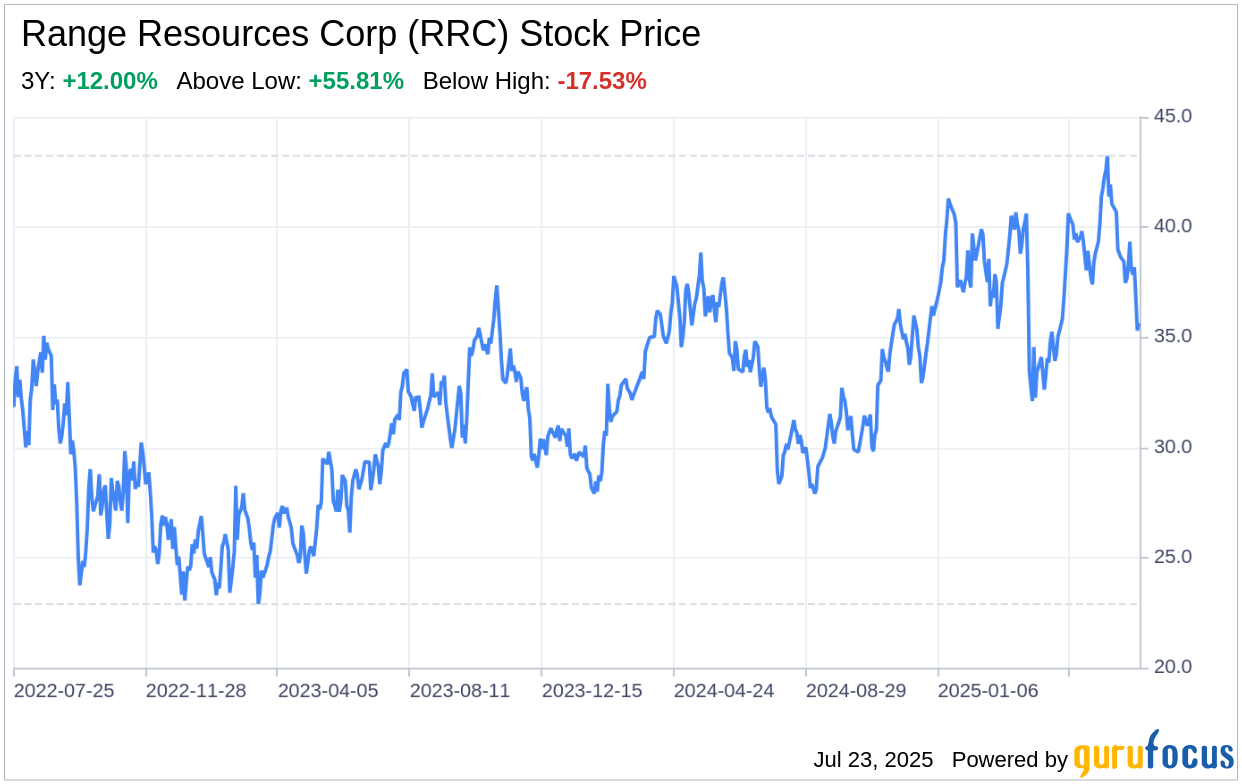Range Resources Corp (RRC, Financial), headquartered in Fort Worth, Texas, is an independent exploration and production company with a concentrated operational focus on the Marcellus Shale in Pennsylvania. As of the end of 2024, RRC's proven reserves stood at 18.1 trillion cubic feet equivalent, with a substantial daily production rate. The company's financial performance is closely tied to the natural gas market, which accounts for 68% of its production. On July 22, 2025, RRC filed its 10-Q report, revealing insights into its financial health and operational strategies. This SWOT analysis delves into the strengths, weaknesses, opportunities, and threats as presented in the filing, offering a comprehensive view for investors and stakeholders.

Strengths
Robust Production and Reserve Base: RRC's strong foothold in the Marcellus Shale, one of the largest natural gas fields in the world, underpins its competitive advantage. The company's significant proven reserves and daily production rates reflect a solid operational base that supports long-term sustainability and growth potential. This strength is further bolstered by RRC's disciplined capital investment approach and commitment to maintaining a competitive cost structure, which are critical in managing the inherent volatility of commodity markets.
Financial Discipline and Hedging Strategies: RRC's financial statements demonstrate prudent fiscal management, with a focus on generating consistent cash flows and optimizing drilling and operational efficiencies. The company's use of derivative instruments to hedge against price fluctuations showcases a strategic approach to managing market risks, ensuring a degree of stability in revenue streams despite the unpredictable nature of commodity prices.
Weaknesses
Commodity Price Dependency: RRC's reliance on natural gas production makes it susceptible to the fluctuations of commodity prices. The 10-Q filing indicates that while the company has mechanisms in place to manage price risks, such as hedging, the inherent volatility in natural gas prices remains a fundamental weakness. This exposure to market dynamics can significantly impact RRC's revenues, profitability, and cash flow, as well as its ability to attract capital and maintain growth.
Environmental Regulatory Pressures: The energy sector is increasingly subject to stringent environmental regulations. RRC's operations, particularly in the area of hydraulic fracturing, are under constant scrutiny from regulatory bodies. While the company has not reported material liabilities for remediation as of the filing date, the potential for future environmental claims or changes in legislation poses a weakness that could affect operational costs and public perception.
Opportunities
Infrastructure Expansion and Technological Advancements: RRC has the opportunity to leverage advancements in drilling and production technology to enhance efficiency and reduce costs. The company's strategic focus on the Marcellus Shale presents opportunities for infrastructure expansion, which could facilitate increased production and access to new markets. Additionally, the growing demand for cleaner energy sources positions RRC to capitalize on the natural gas market's potential for expansion, particularly in the context of U.S. LNG export facilities.
Strategic Acquisitions and Partnerships: The 10-Q filing suggests that RRC's strategy includes occasional complementary acquisitions and divestitures, which could provide opportunities for growth and diversification. Strategic partnerships and joint ventures could also enable RRC to expand its operational footprint and share the risks and rewards associated with exploration and production activities.
Threats
Geopolitical Tensions and Market Competition: Global events, such as the Russia-Ukraine conflict and Middle East hostilities, can disrupt energy markets and affect commodity prices. RRC's operations, while primarily domestic, are not immune to the ripple effects of international tensions. Moreover, competition within the energy sector is intense, with numerous players vying for market share. RRC must navigate these competitive pressures while maintaining its operational and financial performance.
Environmental and Social Governance (ESG) Concerns: Investors and consumers are increasingly focused on ESG factors when evaluating companies. RRC's environmental impact, particularly in relation to greenhouse gas emissions and water usage, could pose a threat to its reputation and investor appeal. The company must continue to address ESG concerns proactively to maintain its social license to operate and attract ESG-conscious investors.
In conclusion, Range Resources Corp (RRC, Financial) displays a strong operational foundation with significant natural gas production capabilities, underpinned by financial discipline and strategic risk management. However, the company must navigate the challenges posed by commodity price volatility, environmental regulations, and competitive market forces. Opportunities for growth and efficiency gains exist through infrastructure development and technological advancements, while strategic acquisitions and partnerships could further bolster RRC's market position. The company must remain vigilant in addressing threats from geopolitical tensions and ESG concerns to sustain its competitive edge and drive long-term value for stakeholders.
This article, generated by GuruFocus, is designed to provide general insights and is not tailored financial advice. Our commentary is rooted in historical data and analyst projections, utilizing an impartial methodology, and is not intended to serve as specific investment guidance. It does not formulate a recommendation to purchase or divest any stock and does not consider individual investment objectives or financial circumstances. Our objective is to deliver long-term, fundamental data-driven analysis. Be aware that our analysis might not incorporate the most recent, price-sensitive company announcements or qualitative information. GuruFocus holds no position in the stocks mentioned herein.
